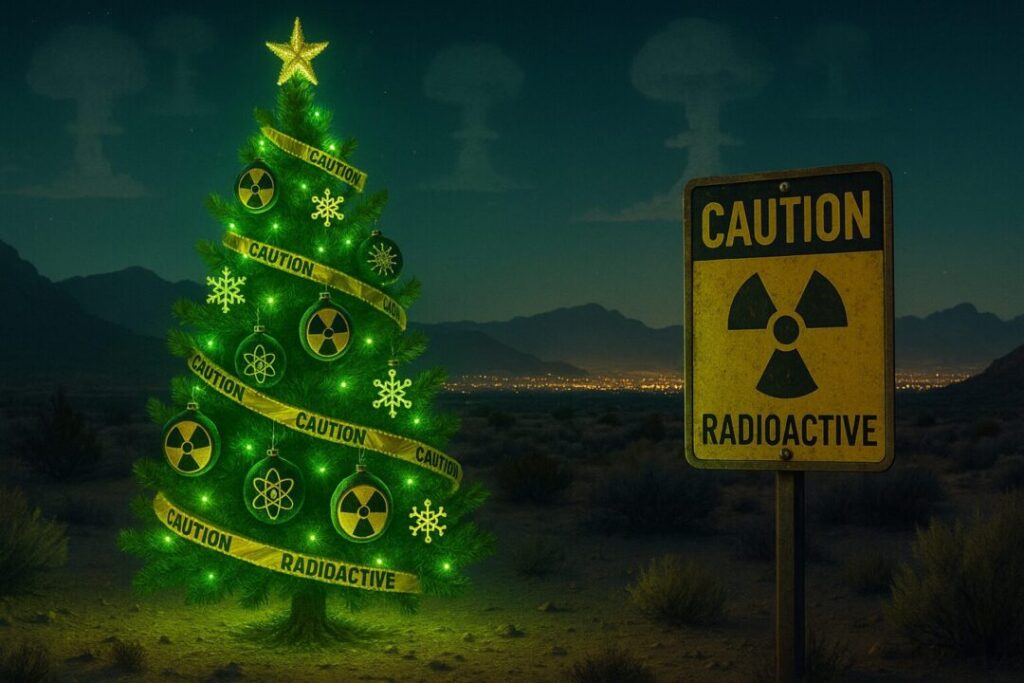This year, the U.S. Capitol Christmas Tree – the “People’s Tree” – will come from right here in the Silver State.
A 30-something-year-old Jeffrey Pine from Nevada’s own Humboldt-Toiyabe National Forest has been chosen to stand tall on the West Lawn of the U.S. Capitol for Christmas 2025.
It’s the first time in over a decade Nevada has had the honor, and it’s a big deal for our state. Rep. Mark Amodei (R-NV), who announced the selection earlier this week, called on Nevadans to take pride and pitch in.
Locals across the state are encouraged to craft handmade ornaments, due by September 15, that will help decorate the tree when it arrives in Washington, D.C., this December.
Nevada, it’s our time to shine! This year’s Capitol Christmas Tree is coming from the Humboldt-Toiyabe National Forest, and we have the opportunity to help decorate it.
So, let’s get in the Christmas spirit early and show the other 49 states how the Silver State celebrates!… pic.twitter.com/i2nfb03Kwq
— Rep. Mark Amodei (@MarkAmodeiNV2) July 28, 2025
As an excited Nevadan, I clicked the little “Tell Me More” feature at the top corner of Rep. Amodei’s post on X, expecting some history on the tradition, maybe the last time Nevada supplied the tree, something like that.
What did X’s AI chatbot, Grok, highlight instead? Potential radiation.
It focused on the Nevada Test Site, fallout zones, strontium-90, and whether the tree might be “radioactive.”
Seriously?
When asked why it went there first, here’s what the bot had to say:

Long story short, it gave us drama because drama engages people – but let’s get real.
Is the tree dangerous? Nope.
Does anyone have any proof that it’s radioactive? Also no.
Has it been tested? There’s no public statement from the U.S. Forest Service or the Department of Energy that it has – or that it even needs to be.
Yes, Nevada was part of the nuclear testing era. From the 1940s through the early ’90s, more than 900 tests happened at the Nevada Test Site, about 65 miles from Las Vegas. Some of that fallout did spread.
That’s old news, and it’s part of our state’s colorful history. Suggesting this Christmas tree poses a health threat is pure speculation with zero scientific backing.
If there were even a sliver of concern, you can bet the Forest Service wouldn’t let the thing get anywhere near the Capitol.
So let’s forget the fantasy of a radioactive Christmas tree and mutant Santas and focus on why this tree actually matters.
The tradition of a Capitol Christmas Tree dates back to at least 1919, was made an official event in 1964, and has grown into a proud, cross-country celebration.
Since 1970, the U.S. Forest Service has provided trees from various National Forests. Each year, a different National Forest is selected to send a tree.
This year, the honor belongs to Humboldt-Toiyabe – the largest National Forest in the lower 48 states.
It covers more than 6 million acres across Nevada and parts of eastern California, full of rugged beauty and American spirit.
It covers more than 6 million acres across Nevada and parts of eastern California, full of rugged beauty and American spirit.
The tree being sent is over 30 feet tall, carefully chosen by local forest rangers for its shape, health, and location.
It will be cut, loaded onto a decorated semi-truck, and travel across the country, stopping in towns along the way, before arriving at the Capitol just in time for the holiday season.
It’s called the “People’s Tree” because it doesn’t come from Washington elites.
It comes from everyday Americans, from the land we call home, and from the hands of children, veterans, and volunteers who make ornaments and send Christmas cheer across the miles.
And this year, it’s coming from us.
Nevada doesn’t always get the spotlight in national traditions. We’re often seen as the land of casinos and, well, desert. But this tree tells a different story; one about our forests, mountains, resilience, and community.
It reminds folks in D.C. that Nevada is more than neon lights and tumbleweeds. We’re part of the fabric of America, and we’ve got a whole lot to be proud of.
So while AI wants to worry about fallout from 1957, we’re focused on something else: the future.
We’ll be over here stringing lights, crafting ornaments, and celebrating the rare honor of seeing a piece of Nevada light up the Capitol this Christmas.
This article was written with the assistance of AI. Please verify information and consult additional sources as needed.




